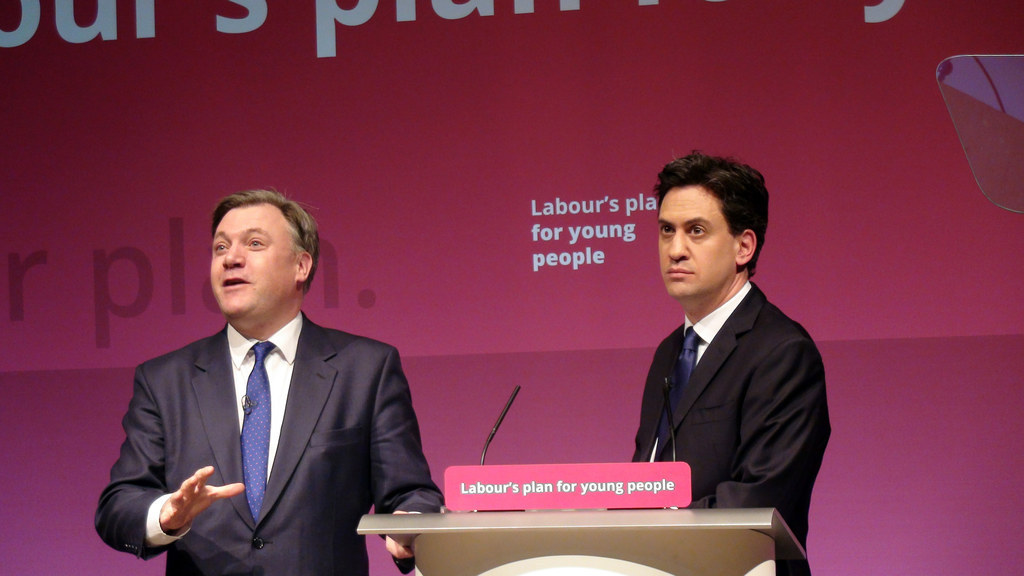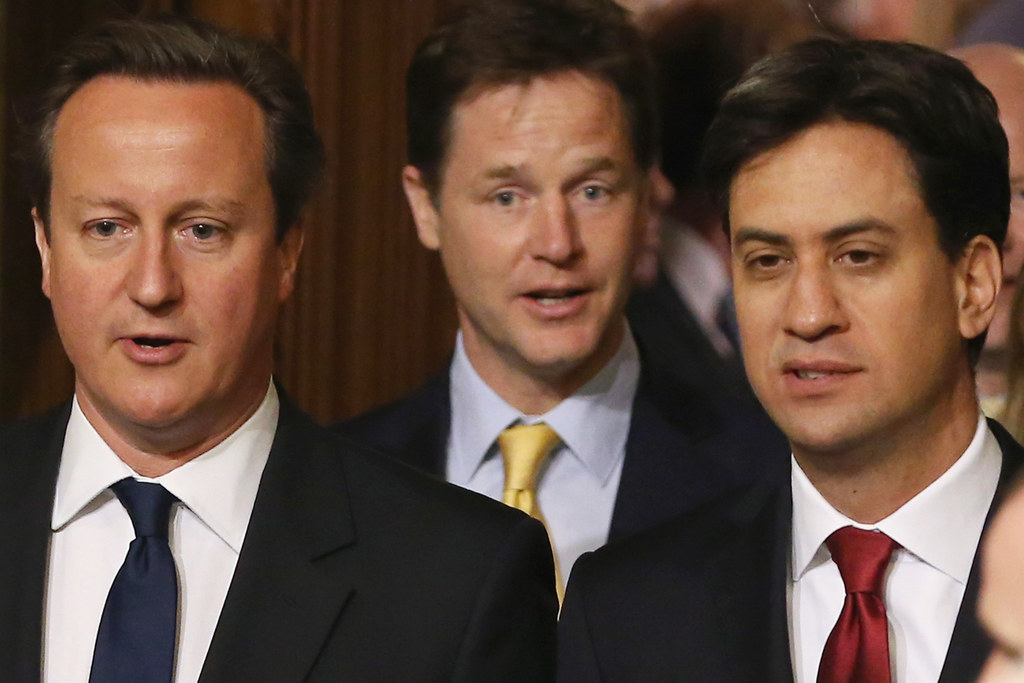
LEEDS – Ed Miliband has finally announced Labour's tuition fees policy: a reduction from £9,000 a year to £6,000 for undergraduates from September 2016, funded by cutting pensioner benefits.
But after his speech, in a dimly lit room at Leeds College of Music, he is instead talking to BuzzFeed News about the colour of The Dress – and the Labour leader is firmly in the white-and-gold camp.
"There were other [pictures] I saw that looked different," he says, as he squints at an iPhone picture of a wedding dress in Scotland. Regardless, he declares that "collective responsibility" means the Labour's shadow cabinet are now required to back their leader on this key matter.
It's white and gold, and that's a manifesto commitment.
Aside from the debate over dresses, Miliband's in a strange position.
Neck and neck in the polls with David Cameron, he's announced a populist reduction in tuition fees that has nonetheless received a kicking from critics on all sides. His commitment will see the average student debt fall from £44,000 to the still substantial sum of £35,000, with additional help in the form of an increase in maintenance grants for half of students (those whose parents pay the basic rate of income tax).
But one of the policy's fiercest critics, Martin Lewis of the Money Saving Expert website, has called it a "financially illiterate" policy which will mainly benefit wealthy families. The Liberal Democrats, who had their fingers burnt by pledging to cut tuition fees only to backtrack when in government, say it's unsustainable. Universities themselves are worried about losing income.
Miliband insists he'll push ahead with the policy anyway.
And he adds that he will keep his word to students under any circumstances, because to his mind this is about making clear the generational divide in the policies being offered by the two major parties: While the Conservatives are proposing more generous benefits for pensioners, Labour is offering financial help to the young.
"It's sending a clear message to students that we want to make a difference to the situation they face," he insists, arguing that most current graduates will never get around to paying off their loans within the 30-year window for repayment. "It's a burden of debt on them, it's a burden on the taxpayer, and it's a bad system."
Even if Labour doesn't win a majority and Miliband has to enter coalition in order to become prime minister, he insists he will require any partner – Lib Dems, the SNP, the Greens, whoever – to agree to the cut in tuition fees before signing off on any deal.
"It's important to keep my promises to young people. Young people are so sceptical about politics and politicians: It's really important that every policy must be credible and funded. Or you get the Nick Clegg problem. I always said: Watch this space, I'm not going to do a Nick Clegg, we're not going to announce a policy which isn't funded and isn't clear.
"No ifs, no buts, no Nick Cleggs: We're going to do it."

The problem is, not everyone in his own party agrees that subsidising university fees is the best use of several billion pounds of public funds.
Even Miliband himself admits to BuzzFeed News that this is a temporary measure, a "policy for the next parliament" ahead of his long-term plan to move to some sort of permanent "graduate tax" on the earnings of everyone who were to university.
But among the benefits, he insists, will be that people don't feel mentally crushed by the level of debt accrued during their degree: "Every graduate – low income, high income – comes out of university and looks at their debts. For every graduate across the country, this will make a difference."
So why £6,000? Why not roll fees back to £3,000, as under the last Labour government? Or make university free, as the Greens propose?
"This is what's affordable," he says. "It sticks to the choice I made four years ago."
The Lib Dems argue that raising fee to £9,000 hasn't actually put off the poorest students from going to university – so what's the point in this handout? Miliband says this is rubbish: "I don't buy the argument that cost isn't one issue. People are far too complacent about this access stuff."
Ask for a concise pitch to the electorate on Labour's policies and this is what you get: "A better plan, a better future."
"If you want to say what is the future, there's two different visions," he tells BuzzFeed News. "One says it's only when working people succeed that Britain succeeds and we need every person to do well in our country, [the other] that we help the richest in our society and let the wealth trickle down. They're the two philosophies at play in this election."
He continues: "You raise the minimum wage, you reduce the burden of debt on your people, you have a strong NHS. That's the way we succeed as a country. Every time Cameron and Osborne say the economy's fine, people right across the country are sitting at their kitchen tables asking what's happening, asking what are these guys on?
"The misunderstanding in Westminster is that the cost-of-living crisis is some passing phenomenon. You saw it was with the zero-hours contract figures only this week. That is absolutely about an insecure economy, where wages aren't growing sufficiently and where we've too much of an economy based on low skill and low wages."

Miliband has still got 68 days of brutal campaigning to convince the public – or face the end of his frontline political career.
He has to present himself as both a caring leader and someone who could take tough prime ministerial decisions on dealing with radicals such as "Jihadi John", aka Mohammed Emwazi. On which topic, he refuses to join in the criticism of Britain's intelligence agencies over their treatment of Emwazi: "It's incredibly important we support our security services – they're the people trying to keep us safe."
But with just weeks to go until the election, he's still yet to open up a decent poll lead.
"Four and a half years ago," he counters, "no one would have said Labour would be in [in contention], people said we'd be out for two terms. We've been constantly underestimated: I'm relishing it. I love campaigns."
Even if you have to spend half the campaign being asked questions about daft things like the colour of dresses?
"That's all your fault."
